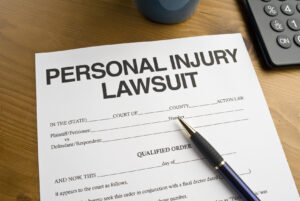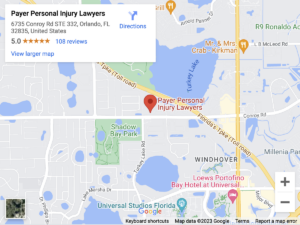
If someone else caused your injury or accident, you might have the right to file a personal injury lawsuit against them under Florida law. A personal injury lawsuit seeks compensation for damages, including financial losses, emotional distress, and physical pain. Contact our Orlando personal injury lawyers to determine if you have a claim or lawsuit.
However, Florida restricts the time you have to file a personal injury lawsuit to pursue a claim in court. The deadline to file lawsuits is known as the statute of limitations.
Why Does Florida Have a Statute of Limitations for Personal Injury Lawsuits?

A statute of limitations bars claims after a certain period. If you file a personal injury lawsuit after the Florida statute of limitations expires, the court can dismiss your case.
The judge is not required to consider whether you have a valid case against the other party. The court can dismiss the case for no other reason than you missed the filing deadline.
Limiting the time an injured party has to pursue a personal injury case might seem unfair. However, the state has several good reasons for setting a statute of limitations, including:
- Encouraging parties to litigate disputes in a timely manner.
- Preventing an injured party from using the judicial system to litigate old matters.
- Ensuring both parties have access to evidence to present the best case possible.
Each state sets the statute of limitations for personal injury claims filed within their state. Unless there is an exception or extenuating circumstances, failing to meet the filing deadline means giving up your legal right to pursue your case through the courts.
What Is the Florida Statute of Limitations for Personal Injury Cases Filed in Orlando?
The statute of limitations for most personal injury cases based on general negligence is two years from the injury date. This deadline applies to cases that arose on or after March 24, 2023.
However, cases that arose before that date could have a four-year filing deadline. Florida recently modified the statute of limitations for most general negligence claims from four years to two years. Examples of general negligence claims include but are not limited to, motor vehicle accidents, slip and fall accidents, and amusement park accidents.
Florida’s statute of limitations for wrongful death claims is also two years. However, the two-year deadline does not begin until the date of death. Therefore, if a person is injured in a car crash and dies two weeks later because of their injuries, the statute of limitations would begin on the day they died, not the date of the accident.
Lawmakers did not modify the statute of limitations in intentional tort cases or non-negligence causes of action. The deadline for filing a lawsuit in these cases is four years from the injury date. Intentional torts and non-negligence claims include assault, dog bites, and many product liability claims.
What Is the Statute of Limitations for Medical Malpractice in Orlando, FL?
The statute of limitations in medical malpractice claims is generally two years from the malpractice date. However, there are exceptions to this rule.
For instance, the “discovery rule” gives you two years from the date you should have reasonably discovered or discovered your injury was caused by medical malpractice. The reason for this rule in medical malpractice claims is to allow for delayed injury symptoms. Additionally, some conditions might not develop right away.
Further, the statute of repose does not indefinitely extend the time to file a medical malpractice lawsuit. There is a hard deadline of four years from the date of the medical malpractice to file a lawsuit. It does not matter when you discovered the injury.
Another exception is made in cases when the medical provider tried to conceal the malpractice or used misrepresentation or fraud to hide the malpractice. In these cases, you could have up to seven years from the date of the malpractice to file a lawsuit. However, the deadline to file is two years after discovering the medical malpractice.
Ultimately, determining the statute of limitations for a medical malpractice case is complex; you should contact our Orlando personal injury lawyers as soon as possible if you think you might have a claim.
What Is the Statute of Limitations for Personal Injury Lawsuits on Behalf of Minors in Orlando, FL?
The deadline to file a personal injury lawsuit can change when a minor is the injured party. The statute of limitations for minors is tolled until their 18th birthday in some cases. However, in most cases, there is a hard deadline of seven years after the accident or injury, regardless of age.
The statute of limitations in medical malpractice lawsuits for minors is different. The four-year statute of repose in medical malpractice cases does not apply if a child is under eight years old. However, the general two-year deadline to file a minor’s medical malpractice lawsuit would still apply.
Calculating the statute of limitations for childhood injuries is also complicated. Parents or guardians should seek immediate legal advice to avoid losing the right to bring a claim on behalf of a child.
What Is the Statute of Limitations for Personal Injury Lawsuits Against Government Entities in Orlando, FL?
The Florida Torts Claims Act allows personal injury lawsuits against the government. However, you must file a notice of claim with the Florida Division of Risk Management or an appropriate local government agency within three years before filing a personal injury lawsuit against a government entity.
The government has 180 days to review the claim. If it denies the claim or does not respond, you have three years from the injury date (two years from death) to file a lawsuit against a government entity.
Government tort claims are complicated personal injury cases. Prompt legal advice is the best way to protect your right to compensation for a claim.
When Do I Need To Talk to a Lawyer About the Florida Statute of Limitations for My Personal Injury Claim?
The short answer is immediately. There could be other exceptions to the statute of limitations in your case. The facts of your case could change the statute of limitations for your claim.
It is in your best interest to contact an attorney as soon as possible after an injury or accident. Losing the right to pursue a legal claim against the party who caused your injury is devastating. Instead of receiving compensation for damages, you would be responsible for all losses associated with your injury.
Learn More During a Free Consultation With Our Orlando Personal Injury Lawyers
Don’t let the party who caused your injuries get away with their actions. You can contact today Payer Law Personal Injury Lawyers for a free case evaluation with one of our experienced Orlando personal injury attorneys. We are ready to help you get the compensation you deserve after a personal injury or accident. Call us at (407) 648-1510.

